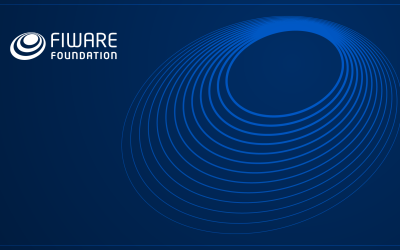Berlin, August 11, 2021 — FIWARE Foundation, the non-profit organization that drives the definition and encourages the adoption of open standards-based on Open Source technologies, reference architectures and over 600 Smart Data Models – to ease the development of smart digital solutions across multiple domains, today announces its accelerated growth across Japan.
FIWARE Foundation’s engagement with Japan’s smart city initiatives dates back to four years ago, when NEC, a Japanese multinational information technology and electronics corporation, joined the foundation as a Platinum Member. Ever since, FIWARE presence has grown exponentially with several cities currently deploying FIWARE technologies and key organizations within the country joining the foundation. Additionally, in 2017, 2018, and 2019, FIWARE joined the Kyoto Smart City Expo as a partner and exhibitor.
The timing for bringing all pieces together could not have been better as all eyes are currently on Japan’s digital transformation. Traditionally fond of paper bureaucracy, Japan has experienced how COVID-19 has stressed the higher need for digitisation and further modernisation of public services across all areas. In spite of its global recognition for cutting-edge technological progress, Japan’s public sector has been on the slower side when it comes to fully embracing the digital era.
The country has, however, stepped up significantly in recent years. In May 2020, Japan enacted its ‘Super City’ Law, which aims to foster collaboration between the public and private sectors to drive the transformation of its cities. By deploying AI and Big Data across health, climate, energy, tourism, education, and transportation, among other areas, the goal is to tackle two long-overdue issues: ensuring that siloed agencies collaborate and that systems are interoperable across the most diverse regions and industries.
Such is Japan’s commitment to becoming digital that hundreds of new digital initiatives are being put together around a vision known as Society 5.0. By incorporating the latest technological innovations into every aspect of Japan’s aging society, Society 5.0 strives to create a new social and economic model that puts sustainability, human-centric approaches, and data privacy first. Such a stance dovetails with FIWARE’s global strategy for digitalization journeys, following the ‘System-of-Systems‘ approach.
FIWARE technology deployment grows across regions
A strong advocate for wider open source adoption, FIWARE Foundation is also an active contributor to a broad range of open standardization activities that are vital to allow communication between the various resources that tech providers rely upon. That has led FIWARE to be an active partner of Japan’s smart city strategies to date. The cities of Takamatsu, Kakogawa, Toyama, Niihama, as well as the prefectures of Okinawa, and Shizuoka, are among the municipalities that are already deploying FIWARE tech within their smart cities initiatives.
For instance, Takamatsu, a port city on Japan’s Shikoku Island, has adopted FIWARE to help move forward it’s smarter city vision. The city’s IoT-based visualization system for disaster management integrates a wide selection of information and visualizes the real-time emergency situation on the integrated dashboard. It allows the city to mitigate disaster damages by proactively delivering flood sandbags and notifying the local traffic service providers of an emergency situation.
This way, the municipality can make quick and timely decisions when ordering or advising evacuation processes. Takamatsu city’s data-sharing-oriented Common IoT Platform is based on FIWARE technology. The platform stores and manages acquired data in a unified manner using its context management function and provides it to the data user in the form of a standard API.
In 2018, in an attempt to reduce crime rates, Kakogawa’s city’s municipal government, in cooperation with the Ministry of Internal Affairs and Communications and private businesses, installed a smart networked camera and sensor system to allow residents to help keep their neighborhood safe, whilst protecting their data and privacy.
Popularly known as the mimamori system, it consisted of about 1,500 networked cameras and 2,000 sensors installed both in fixed locations and on 265 government vehicles as well as on 176 Japan post motorcycles. The system is able to detect residents carrying Bluetooth Low Energy tags to confirm their location. The city uses FIWARE open source components to power some of its smart cities and protects their data.
Currently, in addition to the aforementioned six cities and prefectures, at least eleven other Japanese cities are in the planning phase of deploying FIWARE technology, according to a recent update provided by NEC, and will soon be featured in FIWARE’s Smart Cities Booklet, ed.02 and ed.03.
Collaboration is the key
FIWARE’s growth in Japan has also been driven by key stakeholders in the country that have joined the foundation in the past years. In 2018, IT service management company TIS joined and has been an active member ever since. TIS applies FIWARE to data interfacing with robots, IoT, open data, and other solution components, including smart city services, and has also begun R&D work on a platform supporting human-robot coexistence for robot integration services.
In early 2020, the Data Trading Alliance (DTA) joined as a strategic partner and has been, together with FIWARE, advocating for initiatives that promote data sharing and the implementation of international standards, using open source technologies. In April 2021, DTA merged with another organization and became the Data Society Alliance.
New members
In the first half of 2021, two new members were welcomed to the FIWARE Community and will surely further expand the collaboration between FIWARE and Japan’s smart cities initiatives.
Code for Japan: Founded in 2013, the organization uses a Civictech approach to foster a culture of innovation and entrepreneurship so that everyone, including citizens, business executives, and government officials, can fully grasp the challenges faced by the region and how best to solve them.
Smart City Institute Japan (SCI-Japan): A not-for-profit organization launched by Mitsubishi UFJ Research and Consulting and Nikkei, SCI-Japan provides a membership program for public, private, and social sector organizations that are working in the development of smart cities in Japan. SCI-Japan has also been actively engaged with global organizations – such as FIWARE Foundation – to foster initiatives related to smart cities. Between November 08-12, FIWARE Foundation CEO Ulrich Ahle will join SCI-Japan’s webinar series “European Smart City-Inspired Week” to discuss the latest developments with regards to the use of FIWARE technology and open common standards across Japan and share best practices with organizations from around the world.
Code for Japan and SCI-Japan join forces with other Japanese organizations that share FIWARE’s long-standing commitment to creating sustainable smart solutions and have been working together with FIWARE Foundation to establish shared objectives and developments around technologies for data exchange, data catalogues, and data marketplaces.
Both organizations have reassured their commitment to explore opportunities in relation to the data economy, promoting their respective activities worldwide and identifying avenues for project financing and implementation in different sectors around the world, as well as jointly organizing sessions to serve as matchmaking platforms between the public and private sector. Such activities promote private-public-partnerships and are essential to support the development of sustainable business ecosystems.
Japan’s smart city initiatives play a key role in the country’s digitisation and economic revival, and FIWARE is beyond proud to be actively involved in the process.
“Technologies, such as edge computing, blockchain, digital twin, artificial intelligence, to name but a few, are becoming key driving forces in societal transformation. The FIWARE Community has been striving to cater for this revolution. FIWARE Community’s efforts on that front mirrors Japan’s acute commitment to this new level of innovation. Lately, Japan has been pushing for harmonized architecture for smart cities and has thoroughly embraced open standards and we praise the country’s efforts. I believe that the materialization of a data-driven society is vital in supporting the activation of the Japanese industry, thereby strengthening Japan’s international competitiveness.” – Ulrich Ahle, FIWARE Foundation CEO.
About FIWARE Foundation
Together with its members and partners, FIWARE Foundation drives the definition – and the open source implementation – of key open standards that enable the development of portable and interoperable smart solutions in a faster, easier, and affordable way, avoiding vendor lock-in scenarios, whilst also nurturing FIWARE as a sustainable and innovation-driven business ecosystem. The foundation achieves this through the support of a fast-growing global community that shares a common vision and combines their efforts toward making FIWARE the open source technology of choice for industries, governments, universities, and associations to reach their full potential and scale up their activities, thereby, entering new markets and growing their businesses. Founded in 2016, the foundation has Atos, Engineering, Red Hat, NEC, Telefónica, and Trigyn Technologies among its 430+ members. For further information, refer to FIWARE’s Press Kit and follow the organization on Twitter, LinkedIn, and YouTube.
Press Contact
Val De Oliveira
valdirene.deoliveira[at]fiware.org


